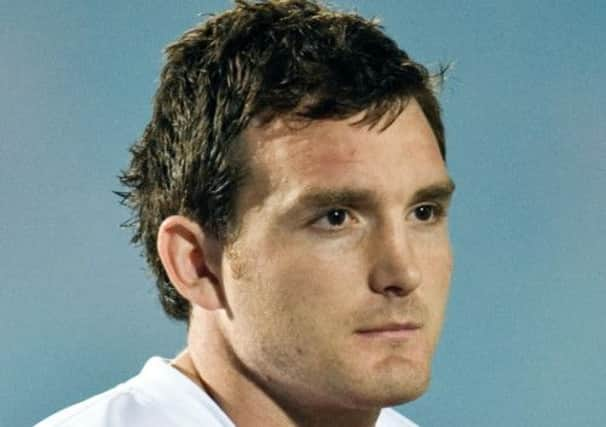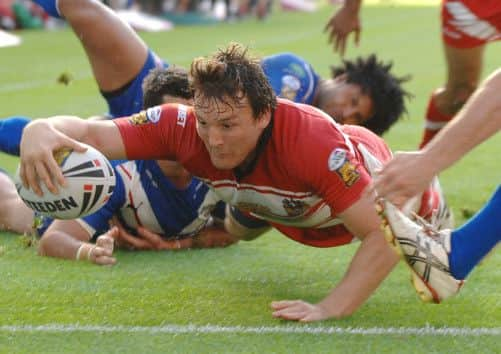Martin Gleeson: Off-field battles of a rugby player


THERE was a time when Martin Gleeson could not even face such a simple task as sifting through his mail such was the grip depression held over him.
Consumed by darkness following the 18-month ban he received for a positive drugs test while at Hull FC in 2011, the ex-Great Britain centre cut himself off from the rest of the world.
Advertisement
Hide AdAdvertisement
Hide AdThankfully, with help from his close family, Gleeson finally dragged himself clear from that malaise and is now back playing in Super League with Salford City Reds having started to face his problems head on.


It means he is in a good place to understand what a current Hull FC player – Brett Seymour – is now experiencing himself.
The Australian scrum-half is on indefinite leave from the East Yorkshire club after his wife claimed a car crash in which he was involved 10 days ago might have been a desperate attempt to take his own life due to the effects of depression.
After the tragic suicide of former Leeds, Bradford and Great Britain hooker Terry Newton in 2010 – a close friend of Gleeson’s – it was a timely reminder that life as a professional rugby league player is not always the glamorous, dream job so many envisage.
Advertisement
Hide AdAdvertisement
Hide AdSpeaking exclusively to the Yorkshire Post, Gleeson said: “I suffered from depression myself when I got that ban because of all the stuff that happened.
“It really knocked me for six and I feel for Brett what he’s going through now. People don’t understand what it (depression) involves.
“I locked myself away for a bit. I don’t know what he’s going through personally but once it grabs hold of you depression is tough.
“I wouldn’t speak to anyone for a while, kept myself to myself, went off and did my own thing and became a bit of a hermit really.”
Advertisement
Hide AdAdvertisement
Hide AdGleeson, now aged 32, was tested positive for methylhexaneamine shortly after joining Hull in 2011.
He was one of a number of their players taking the banned stimulant in a supplement supplied by the club’s conditioner Ben Cooper, unaware it was illegal.
Cooper, Hull chief executive James Rule and Gleeson – the only player testing positive after a sample was taken following the Salford game on May 13 – were all banned following a six-month investigation by UK Anti-Doping (UKAD).
Gleeson was eventually sacked after playing just six games for the Black and Whites but always claimed he felt he was made a “scapegoat” .
Advertisement
Hide AdAdvertisement
Hide AdSeymour, meanwhile, has struggled for form since arriving at Hull from New Zealand Warriors last season.
He had already endured a turbulent career that saw him sacked by Brisbane Broncos in 2006 and, again, Cronulla Sharks three years later for alcohol-related incidents.
The 28-year-old was also banned from driving for seven months in November 2011 just before joining Hull.
Despite signing a lucrative three-year deal, his future was already quickly in doubt just months into his debut campaign as the 2005 Challenge Cup winners made it clear they were looking for at least one new half-back.
Advertisement
Hide AdAdvertisement
Hide AdHe stayed put and played two matches so far this season before the troubling incident that led to his wife’s admission but Gleeson – who started his career at Huddersfield Giants but won Grand Finals with St Helens and Wigan in addition to a Challenge Cup success – can see how Seymour may have suffered.
“He was having to turn up to training every day and speak to people so probably had to keep everything in,” he said. “I don’t know if he needed someone to talk to but sometimes you just think ‘I don’t want to talk to anybody.’
“Every case is different but obviously he’s been getting a lot of stick from the fans too.
“Sometimes, when you’re not playing well, you try too hard and think you’ve got to play your way out of this but sometimes it just doesn’t work.
Advertisement
Hide AdAdvertisement
Hide Ad“I’ve heard the owners have been publicly criticising him as well. If you’re doing all the wrong things off the field – like going on the beer – then you’re open to that but if you’re doing the preparation all right, are really trying hard and it’s still not happening you end up digging a hole.
“You’re trying to make things better but it’s just not working. If that’s the case you feel sorry for the lad.” However, Gleeson’s own renaissance is proof a player can battle back from such an affliction.
Making only his third appearance since returning from that ban with Salford, he led the club to a 23-23 draw at Wakefield on Sunday and is bidding to finish his often glittering career on a high note.
“For a long time I didn’t speak to anyone except my family and even them I snubbed for a bit,” he recalled.
“A lot don’t know you’re going through it at the time.
“I hope Brett recovers and wish him the best.
Advertisement
Hide AdAdvertisement
Hide Ad“It’s my family who got me through. It was a realisation that I could play again. My ban was up at the end of 2012 and they said ‘Listen, you’re still young, you’ve got a lot more to offer’.
“They put it on me really to challenge myself to show I can still do it. Obviously I’ve now just captained Salford and – once you do come out of it – you just snap clear of it all.
“I’m a lot stronger person now. Whereas before I wouldn’t open my post for months, speak to anyone or answer my phone, now there’s nothing too hard.
“If you do get the help, everything becomes rosy and every day is brilliant. It’s a total transformation.
Advertisement
Hide AdAdvertisement
Hide Ad“It’s like watching black and white TV at the start or having those weird glasses on.
“But if Brett can come through the other side he’ll be a happy man because everything’s then like HD.”
Gleeson says he still has issues to “sort out” with Hull regarding his exit but says his depression is in the past.
“You go through stages and it takes time,” he added.
“There’s shock first, then all of a sudden you get to a point where you look at yourself in the mirror and say ‘What am I doing?’
Advertisement
Hide AdAdvertisement
Hide Ad“Next you get on that road to recovery and even that’s a bit rocky but once you reach where you want to be it’s magic. Everything’s great now.”
After the heartbreaking death of Newton, there was a concerted effort to raise the awareness of mental issues in rugby league.
For too long, in the macho world of this sport and all its adjoined bravado, there had been a stigma attached to mental health.
The State of Mind project was launched in 2011 to help eradicate such problems and create a new pathway for players who may feel they are beginning to struggle.
Advertisement
Hide AdAdvertisement
Hide AdEndorsed by leading stars such as Australia legend Andrew Johns – who suffers from bipolar disorder – and former England captain Adrian Morley, who was a close friend of Newton, it has helped increase the profile of mental illness, its signs and ways in which it can be treated.
St Helens and England international Jon Wilkin is an ambassador for the cause and admitted: “It is imperative we give identified staff in our sport training in mental health first aid to equip us with the necessary skills to detect early signs of problems and as a consequence seek appropriate help at the earliest opportunity.
“Rugby league needs this type of programme now and to continue into the future for sustainable benefit to all players at whatever stage in their career.”
With high-profile supporters from other sports including ex-international footballers Roy Keane and Paul Merson plus former British Lions forward Alan Quinlan, it has certainly helped start break down those barriers.
Advertisement
Hide AdAdvertisement
Hide AdProfessional sport, in general, has historically struggled to address this subject.
Seymour’s problems are the latest to surface and there will be many more yet to be discovered.
But Gleeson’s tale proves there can still be a positive outcome.
Tackling demons
Ex-Leeds, Bradford and Great Britain hooker Terry Newton committed suicide in 2010 aged just 31 after battling depression following his two-year drug ban.
Advertisement
Hide AdAdvertisement
Hide AdAustralian second-row Corey Paterson, currently thriving after signing for Hull KR, missed much of the 2009 NRL season at Newcastle Knights owing to the mental illness.
Warrington Wolves prop Paul Wood admitted “suicidal thoughts” during a bout of depression after his marriage break-up.
Ex-Australia captain Andrew Johns – deemed on of the game’s greatest ever players – told how he regulalry turned to alcohol and drugs to escape the pressures of his high profile. He revealed in 2007 he had earlier been diagnosed with bipolar disorder.